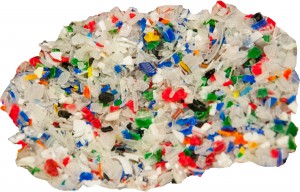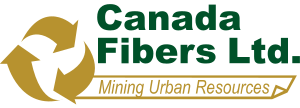Recycling Myths and Facts: What You Need to Know
There’s no shortage of confusion around what can and can’t be recycled, how materials are processed, or what happens after the Blue Box leaves your curb. At Canada Fibers, we believe that education is just as critical as technology when it comes to reducing waste and improving environmental outcomes.
This page separates common myths from facts—backed by experience from our MRF Complex and expertise across our divisions like Urban Polymers and Urban Mining.
Myth 1: “Everything in the Blue Box Gets Recycled”

Fact: Not all items placed in recycling bins are actually recyclable.
Contamination—like greasy pizza boxes, plastic bags, or food-soiled items—can cause entire batches to be rejected.
Facilities like our MRF Complex use advanced technology to sort materials, but they can’t fix incorrect disposal. Clean, properly sorted recyclables are far more likely to be reused in production or sent to partners like Urban Polymers for processing.
Learn more about this issue in our On Point Radio interview where we discuss Blue Box contamination in detail.
Myth 2: “Plastic Can Be Recycled Infinitely”
Fact: Most plastics degrade over time and can only be recycled once or twice before quality diminishes.
This is why Urban Resource Group’s approach to upcycling ocean plastic is so impactful—it turns lower-grade material into a useful product before it ends up in a landfill or the environment.
Myth 3: “It’s Better to Throw It All in and Let the Facility Sort It Out”
Fact: Wishcycling—putting non-recyclables in the bin and hoping it’s recyclable—causes major processing delays and increases costs for municipalities.
Facilities rely on pre-sorted, clean inputs to keep recycling rates high. Our Public Services division works closely with municipalities to educate residents and design systems that minimize this issue.
Myth 4: “Recycling Doesn’t Make a Difference”
Fact: Every properly recycled material reduces the need for virgin resources and lowers emissions.
Materials recovered through Canada Fibers’ ecosystem—like clean wood for Urban Biofuels or compostable organics for Urban Garden Products—are returned to the economy in new, productive forms.
And when done correctly, recycling dramatically reduces waste sent to landfills and the energy required to manufacture new products.
5 Myths Superabsorbent Polymers for Wastewater Treatement (socochem.com)
Recommended Video
Still unsure about recycling best practices? This video breaks it down clearly:
Top 5 Recycling Myths Debunked
Get the Facts—And Be Part of the Solution
At Canada Fibers Ltd., we don’t just process recyclables—we help people understand how to recycle smarter. By tackling misinformation and streamlining systems, we’re making recycling more effective for households, businesses, and municipalities alike.
To explore our long-term vision and sustainability leadership, visit our Company History or learn how we work with industry through Business Services.

